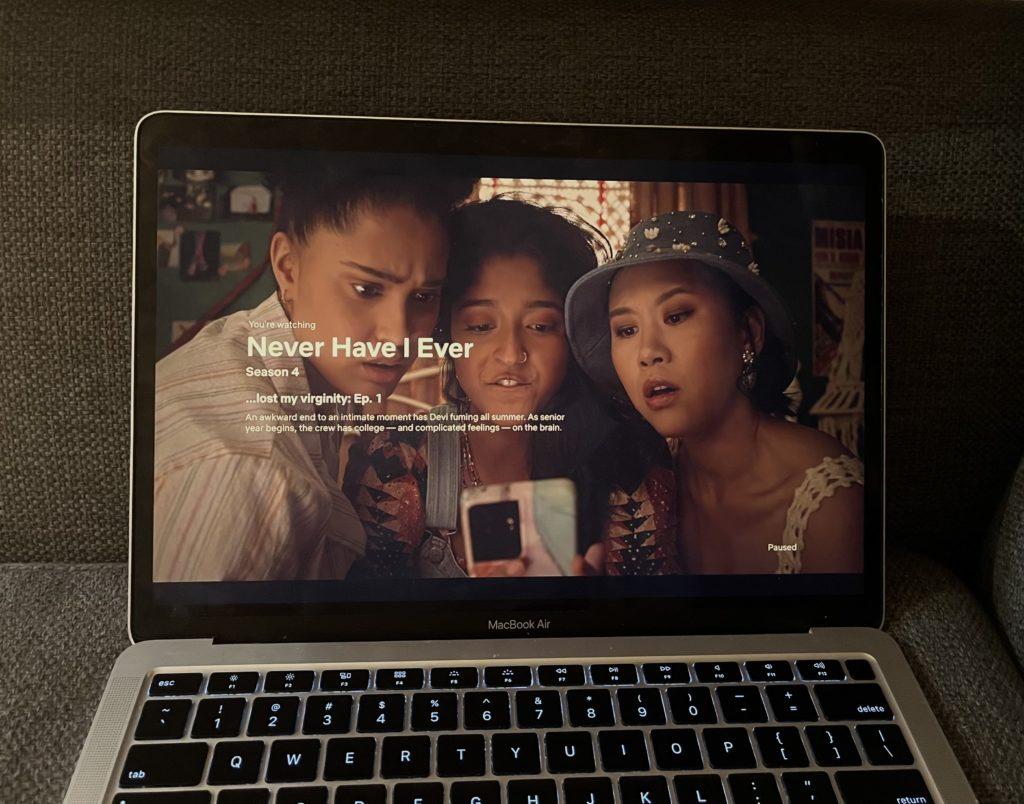In its final season, Mindy Kaling’s cringe-inducing coming-of-age dramedy “Never Have I Ever” grants the Sherman Oaks High squad an abundance of happily ever afters.
Shows tackling the ups and downs of the hormone-fueled awkwardness of high school have become immensely popular in the past few years. But when this Netflix series first premiered in 2020, it differentiated itself from the sea of angsty teen shows by centering on Devi Vishwakumar, a heroine audiences want to hate for her hotheaded nature but whose unflinching vulnerability forces them to root for her anyways.
In true romantic comedy fashion, the fourth season opens just after Devi loses her virginity to longtime academic rival and brief flame Ben Gross, incorporating a classic enemies-to-lovers arc reminiscent of the cutthroat-to-courtship 180 of “You’ve Got Mail.” The scene is borderline painful to watch for its awkwardness alone as Devi points finger guns at Ben and promises to catch him “on the flippity flip” after he essentially kicks her out of his room.
Missed connections play a key role in this season as Ben and Devi struggle to communicate with each other the day after their hook-up, culminating in Ben ghosting Devi for an entire summer break. Devi is left heartbroken when she discovers he is in a relationship as school starts up again, prolonging the will-they-won’t-they dynamic between the two until the series finale, making it worth the watch for devout rom-com lovers.
Unlike previous seasons, Devi is significantly less unhinged, having somewhat matured throughout her high school journey. After watching her try to pet a wild coyote and get bitten in Season 1 and lie to her two previous love interests, Ben and Paxton Hall-Yoshida, about being exclusive with each of them at the same time in the second season, the bar was set pretty high for her poor decision making. Nonetheless, if you have a spare night guard or an apple lying around, I’d still recommend you use them to protect against frustratingly grinding your teeth into oblivion, as these teens make easily avoidable mistakes from dropping out of college due to being unpopular to only applying to Ivy League schools.
Now a senior in high school, Devi has bigger concerns than petty romantic disputes as she focuses on getting into her dream college, Princeton. But true to the teen drama genre, she threatens to fight a washed-up skater boy named Ethan before briefly dating him, has a falling out with her best friend Eleanor over said skater boy and finds herself in a feud with ex-love interest Ben’s new girlfriend Margot Ramos.
The show also frequently zooms out to tackle the struggles of Devi’s friends and family, which are equally as complex and provide a needed break from teen misadventures. Devi’s mother Nalini falls for Margot’s father and must come to terms with moving on romantically after the passing of her husband in the first season. One of Devi’s central character flaws is her selfishness, but in this season, she puts her pride aside, even teaming up with frenemy Margot to set up her mother with Margot’s father to ensure their parents won’t be lonely when they go off to college, a surprisingly tender move.
The appeal of this show is not in its acting, which often resembles the overly dramatic stares and unnecessary yelling of a Disney show, luckily without the forced laugh track. With smatterings of tongue-in-cheek pop culture mentions, even mocking teen show competitors like “Euphoria,” there are plenty of laugh-out-loud moments for viewers.
But the key to the show’s success among its loyal, long-suffering fan base, who are forced to idly watch as Devi makes terrible decisions, is the fans’ commitment to supporting women’s rights and wrongs because no woman is without her flaws and these imperfections deserve to be represented. A welcome break from the stereotypical portrayal of teenage girls as quietly angry and exacting revenge in secret, like the sneaky plotting of the iconic “Mean Girls,” Devi is confrontational and unapologetically messy. From yelling expletives about Ben’s penis in a room full of people after discovering he was dating Margot to suggesting she would beat another student with his own skateboard, Devi has her fair share of loud and chaotic moments this season.
The college application and decision process also looms large this season as viewers watch Devi apply early to Princeton, get sent to the regular-decision pool, and, in one of her worst decisions yet, only apply to Ivy League schools as her back-ups. Devi even gets in an argument with her best friend Fabiola after the latter is accepted into Princeton early, in which Devi blames her for not being accepted, arguing an elite school would never accept two people from the same mediocre high school.
The show’s conflict hits its peak once Devi is rejected from every school except for Princeton, where she is waitlisted. Instead of coming clean to her friends and family, she lies about being accepted to all of the prestigious schools and once again finds herself in a mess of her own making.
Devi earns a final redemption arc as she patches up her friendship with Ben before he ultimately convinces her to fill out an additional essay that lands her a coveted spot at Princeton. Beyond getting accepted into her dream school, Devi grows from this experience coming to terms with the death of her father, being able to openly discuss her grief without anger in her essay. The series resolves with the long-awaited reuniting of Ben and Devi as boyfriend and girlfriend, dating barely long distance with him at Columbia University and her at Princeton.
An emotional support character to many, Devi’s healing journey was the main quest for viewers since much of the earlier seasons centered on her trying to overcome and distract herself from her grief through taking intense courses, pursuing romantic interests and going to therapy. Watching her reclaim her trauma had viewers release a breath they’d unconsciously held all four seasons as Devi found peace and got the ending she always deserved.
From the slow romantic build-up to Devi’s emotional evolution, viewers were on the edge of their seats as the protagonist grew up before their very eyes, making every nail-biting second worth sitting through.




![The [insert here] improv group asks for volunteers during a skit.](https://gwhatchet.com/wp-content/uploads/2025/02/Slate_2_8_25_KW-1-1200x800.jpg)

